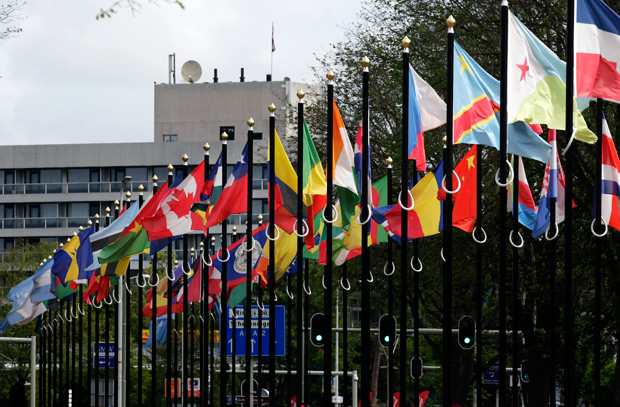Новости – Digest












Digest
Stop Haage Tribunal

The international criminal tribunal building in the Hague © Yves Logghe / AP
International judicial bodies in the Hague fail in their duties
28 декабря, 2015 11:30
3 мин
Russia didn’t support the resolution of the UN Security Council which extended the terms of judges and Prosecutor of the International Criminal Tribunal for the former Yugoslavia. Russian delegation abstained, whereas 14 Security Council members voted for the resolution. Consequently, 17 judges’ terms of office were extended for 3 up to 12 months or “until completion of the cases to which they were or would be assigned”.
Russian diplomats are discontented with the protraction of trials and verdict rendering by the ICTY. This concern was also expressed by other UN Security Council members. 2003, UNSC adopted a resolution to closethe Tribunal in 2010, but in 2010 the terms were extended until 31 December 2014.
In mid-October, then President of the ICTY Theodor Meron announced from UN’s rostrum that the ICTY is goingto close in 2017. A year ago, 2016 was the date. Endless protraction of trials and appeals are for the most part accounted for “organizational challenges”.
The ICTY was established by UN Security Council Resolution 827 on 25 May 1993. For over 20 years, the Tribunal has been looking for and prosecuting people indicted in war crimes on the territory of the country which has become a thing of the past. The indictees are Slobodan Milošević’s generals and ministers, Army of Republika Srpska’s commanders and Muslim and Croatian military alignments’ leaders.
Trial and death
As the Russian Planet has repeatedly written, effectiveness and justice of the ICTY’s decision garner criticism. The most of the convicted persons are Serbian commanders. A few most atrocious Bosnian and Croatian commanders have been indicted, it seems, just to check the box. One of such indictees is Naser Orić, theBosnian Army Commander of Srebrenica.
The Bosnian War (1992–1995) has been the subject of political gambling and provocative acts again Serbian people. In mid-June, a month before it would be 20 years since Srebrenica incident, the UK proposed a draft resolution which declared it genocide and mass executions of the Muslim population. The resolution, being obviously provocative, was met with a veto by Moscow.
One of key figures involved in Srebrenica incident is Ratko Mladić, the Bosnian Serb Army commander of the main staff. He is the last of major Serbian military leaders who is not yet convicted. The Serbian authorities arrested Mladić on 26 May 2011 and extradited him to the ICTY 10 days after. As Meron stated earlier, the trial of the 73-year-old general will be completed only in 2017.
The trial is in process, despite a sorry state of the Bosnian war hero’s health. This September, Russian diplomats were going to offer him medical treatment in Russia, but the ICTY denied the request. Mladić denies all accusations against himself and claims he “defended his people and his country”.
We’ve all leant from Slobodan Milošević’s case what happens to disobedient Serbs in the Hague Tribunal’s detention facilities. The President of Serbia, arrested in 2001, died of a heart attack on 11 March 2006. Three years before the tragedy, Milošević’s wife complained about the medical treatment provided by prison doctors. The ICTY ignored her appeals to change the treatment.
Now Mladić’s life is jeopardized. The general is going to be either driven to an early grave by doctors or sentenced by the Tribunal. On 22 October, Dušan Dunjić, the defence witness in Mladić case was found dead in hotel. It’s noteworthy that it was the day when he was supposed to make a statement in the ICTY. The Hague decided not to carry out an investigation and announced on 26 October that Dunjić died by natural causes.
Sit and wait
The ICTY activity has been received repeated criticism from Russian and Serbian authorities, though the latter, to please the EU, were in search of Serbian military leaders. In addition to the obvious bias, the term of office of the ICTY is out-of-the-ordinary.
The Nuremberg Tribunal, for instance, being the biggest in history, lasted less than a year. It was parties’ cooperation that contributed to the efficient collection of extensive evidence and announcing verdicts against surviving Nazi war criminals.
To illustrate the Hague Tribunal’s progress, one may take as an example the case of Vojislav Šešelj, the President of the Serbian Radical Party (SRS). The politician surrendered to the ICTY on 24 February 2003; it’s 11 years that he has spent in custody. As a result, his health deteriorated: heart disease and colorectal cancer. The verdict is not delivered so far.
There’s an impression that the Hague wants to buy some time; there may be possible reasons for that – from international officials’ disinclination for work to lack of evidence again Serbs. In addition to that, the UN Security Council, which established the ICTY, seems disinterested in international judges’ dereliction.
Apart from the ICTY, the Hague is home to other international bodies, whose objectivity is dubious. This entails the International Criminal Court, which is legally independent from the UN, as well as the International Court of Justice and the European Court of Human Rights, which ordered Russia to pay $50 billion to former Yukos shareholders.
One can often see these organizations mentioned in media, but their activities (if there are any) are not publicly announced. There’s no point for Russia to seek a fair verdict in the Hague. As a UN Security Council permanent member and world power, Russia has the right to call for a shutdown of the ICTY and other kangaroo courts.
поддержать проект
Подпишитесь на «Русскую Планету» в Яндекс.Новостях

Яндекс.Новости



















